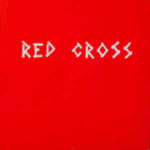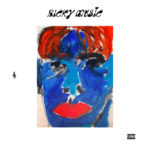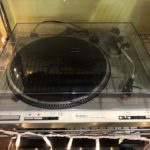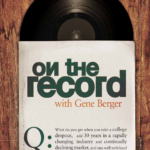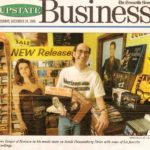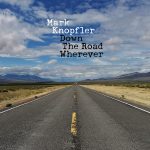
MARK KNOPFLER, Down The Road Wherever (CD/LP)
While it’s hardly a concept record, Mark Knopfler builds his own miniature village on Down The Road Wherever, and the details with which he colors his cast make it easy to imagine his many characters living among each other. Knopfler begins with “Trapper Man,” a number about a skilled trapper who makes a butcher’s block out of a trader’s desk that feels more like a subtle allegory for the dirty work that gets done in order for the finer things in life to exist. Knopfler’s characters feel neither autobiographical nor entirely fictional, thanks in large part to his apparent knack for understanding the human condition. It’s easy to imagine the narrator of “My Bacon Roll” as a longtime barfly who’s rather chatty, if possibly a bit lonely, too. As with the gentleman protagonists “going for the major comeback” in wingtip shoes and Stetson hats on “Back on the Dance Floor,” some of the figures on Down the Road Wherever seem to want a return to some long-gone glory days, but Knopfler only sketches out the what of their wistful desires, not their why. Knopfler wraps his detailed narratives in tastefully arranged instrumentation, which ranges from the twangy “Just a Boy Away from Home,” to the slow-burning drift of “Slow Learner,” to dance-friendly shuffles on “Good On You Son” and “Heavy Up” (on “Nobody Does That,” Knopfler even toys a bit with funk). Light touches of fiddle and allude to Knopfler’s roots in the British Isles, while horns add flares of soul. Even Knopfler’s guitar solos feel politely reserved. Though he’s a celebrated guitarist several times over, Knopfler treats his solos as equally important elements in carrying a song to its conclusion rather than opportunities for flashy grandstanding. There’s a grandfatherly charm throughout the record, both in the comfortable arrangements and Knopfler’s lyrical yarns. Everything about Down the Road Wherever feels warm and inviting; if each song is a miniature room, their display is in a cozy den that also boasts a roaring fire, capacious armchairs, heirloom quilts, and a smell like pipe tobacco and old books. But Knopfler leaves room for the bittersweet, as on the ambling “Drover’s Road” and “Floating Away.” At times, Knopfler tells bits of his own story, as on “One Song at a Time,” where he sings about his own life’s journey (and wryly notes that he’s done watching “poor old fakers / Trying to dance in my old shoes”). Down the Road Wherever‘s final track, “Matchstick Man,” breaks step from the rest of the record, in both its length (it’s the LP’s shortest track by more than a minute) and its stripped-down execution. Accompanying himself on acoustic guitar, Knopfler sings of a lone traveling musician, who, in the song’s final lines, is but a “speck upon these vast and silent plains of snow.” Knopfler’s closing maneuver completes the album with a cinematic flourish, one that makes a surprisingly clean finish for such a richly detailed record.

HISS GOLDEN MESSENGER, Devotion: Songs About Rivers And Spirits And Children (4xCD/4xLP)
This limited-edition deluxe 4-CD/4-LP box set includes remastered reissues of three classic Hiss Golden Messenger albums—Bad Debt, Poor Moon, and Haw—plus Virgo Fool, a bonus album of Hiss rarities available physically only with this collection. The iconographic artwork for each individual album as well as the box set and poster were designed in close collaboration between M.C. Taylor and artist Sam Smith to shed new light on this vital chapter in the Hiss Golden Messenger story. Each reissue features newly penned liner notes by Amanda Petrusich (The New Yorker), with John Mulvey (Uncut, MOJO) providing the essay for Virgo Fool.
CHRIS CORNELL, Chris Cornell (CD/LP)
The first major compilation to be released since the passing of Chris Cornell (who died in May of 2017 at the age of 52), Chris Cornell serves as a strong reminder of just how incredibly talented the former Soundgarden singer actually was. The seventeen track compilation illustrates time and time again that, regardless of the musical vehicle, the power and versatility of Cornell’s voice was simply undeniable. While there are the obligatory hits (“Black Hole Sun”, “Outshined”, “Like A Stone”) that highlight Cornell’s work with both Soundgarden and Audioslave, there’s also a bevy of solo gems like “Seasons” (originally released on the Singles soundtrack), a genius cover of Prince’s “Nothing Compares 2 U”, and a brand new track (leftover from the sessions for his last solo release, Higher Truth) entitled “When Bad Does Good”. It’s on these understated tracks in particular where Cornell’s voice truly shines. What becomes apparent when first diving into this collection is just how potent Cornell’s output actually was.

FLEETWOOD MAC, 50 Years – Don’t Stop (CD/3xCD)
From the Peter Green years to the recent arrival of Neil Finn, in their half-century career Fleetwood Mac have regenerated many times, like a increasingly successful rock Doctor Who. They began as a British bluesboom band, complete with obligatory back-alley album cover shot and a repertoire of amped-up R&B numbers, evolved into a proper early-70s rock band, moved towards a more melodic repertoire, and then turned into a multiplatinum rock-pop soap opera, which they remained as pretty much for three decades, before fading gracefully into stadium nostalgia. The 50 Years: Don’t Stop collection attempts, in strikingly truncated and biased form, to do justice to that career. It does so by devoting three CDs to the band’s 50 years in music (a single CD, reverse-tracklisted oddity is also available for people who like to hear songs in the wrong order). The first CD comprises material from Fleetwood Mac’s blues prime – Shake Your Moneymaker, Black Magic Woman and so on – to their rock era with songs such as Station Man and Sentimental Lady. It’s a career that could have ended there, another rock band who foundered on the shores of the 1970s. But the second CD is, as it were, the money shot, with all the best material from the Buckingham and Nicks years. Disc Three is a mixture of late hits from a more relaxed Fleetwood Mac (at least on record), plus the odd rarity and live track. 50 Years: Don’t Stop is not a comprehensive collection (how could three CDs represent the work of a band who’ve released 17 albums?), and, unsurprisingly, is heavily weighted towards the very big hits, but it’s a useful beginner’s guide to an extraordinary band. Fleetwood Mac are a group whose internal chaos and constant dissolution and re-formation are, bizarrely, the reason they’re still together.
MUMFORD & SONS, Delta (CD/LP)
NEEDTOBREATHE, Acoustic Live 1 (CD)
SMASHING PUMPKINS, Shiny & Oh So Bright (CD/LP)
CARTHY, ELIZA & MARTIN, Hailsham Pavilion (CD)
COMING SOON:
BLACK FRIDAY AT HORIZON RECORDS!
And don’t forget these STILL-NEW platters that matter!
THE BEATLES, THE BEATLES (THE WHITE ALBUM) 50th Anniversary Edition (3xCD/6 CD + Blu ray/4xLP)
In late May, 1968, the Beatles convened at guitarist George Harrison’s English country home with an extraordinary body of raw materials for their next album. The so-called “Esher demos” — 27 songs taped on Harrison’s four-track machine — were at once stark and full, solo acoustic blueprints already outfitted with signature flourishes: double-tracked vocals; John Lennon’s raindrop-arpeggio guitar in “Dear Prudence”; the future guitar solo in “Back in the U.S.S.R.,” hummed by Paul McCartney. There was evidence too of tension and estrangement: Lennon’s jagged rhythms and aggressive cynicism (“Revolution,” “Yer Blues”); McCartney’s determined optimism (“Blackbird”) and almost mutinous cheer (“Ob-La-Di, Ob-La-Da”). In his Appalachian-ballad draft of “While My Guitar Gently Weeps,” Harrison pointedly censured his bandmates, singing “The problems you sow are the troubles you’re reaping.” He dropped the line in the final version. His dismay in the song remained. Those recordings, issued in full for the first time, are the dominant revelation in the 50th-anniversary expansion of The Beatles. At 30 tracks on two LPs and dubbed “The White Album” for its blank-canvas sleeve, it was the group’s longest, most eclectic and emotionally blunt record – an admission of frayed nerves and strained bonds in the zigzag of garage-roots rock, delicate balladry, proto-metal fury, country ham and radical experiment. The “Super Deluxe” edition of The Beatles has even more. In addition to the demos and a new remix of the album overseen by Giles Martin, son of the late producer George Martin, there are 50 tracks of the work in progress – outtakes and sketches; roads not taken and songs left behind – across the summer and fall of 1968. But the Esher tapes are a profound record in themselves. This is an unprecedented view of the Beatles at the ground zero of songwriting as well as the trials and conflict that charged that bounty: the death of manager Brian Epstein in 1967; the chaotic launch of Apple Corps.; the disappointment of the Beatles’ recent trip to India. Lennon takes his swipe at the Maharishi (“Sexy Sadie”); he is also exhausted to the point of begging (“I’m So Tired”). McCartney finds relief in corn (“Honey Pie”). Harrison is coming up strong but frustrated. His Esher songs “Circles” and “Not Guilty” have to wait for solo albums. An alternate down-home “Good Night” is a marvelous shock, Ringo Starr’s homely vocal gilded with earthy harmonies closer to the Band, moving in Byrds-like formation. And do not fear for the original album: Giles’ remix adds depth and detail without betraying the ’68 balance as in the new, striking contrast between the doldrums and tumult in Harrison’s “Long, Long, Long.” The Beatles is now seen as the album on which they started to break up. But it was wisely titled: a self portrait of the band at odds but pulling together behind each writer, playing as they always did: in service to the song.
CHARLES BRADLEY, Black Velvet (CD/LP)
Black Velvet is the fourth and final album from the late, great soul singer Charles Bradley, and this 10-track album is a celebration of the life of the singer who would have turned 70 this past Monday, November 5, and was lovingly assembled by his friends and family. Black Velvet is no anthology, greatest hits or other shallow rehashing of the songs that already made him famous. Rather, this album is a profound exploration through the less-travelled corners of the soulful universe that Charles and his longtime producer, co-writer and friend Tommy “TNT” Brenneck created in the studio together over their decade-long partnership. The album features new songs recorded during the sessions from each of his three albums, heard here for the very first time in all their scorching glory: “Can’t Fight the Feeling,” “Fly Little Girl” and the heart-wrenching single “I Feel a Change” The album also features hard core rarities like his funk-bomb duet with LaRose Jackson, “Luv Jones,” the psychedelic groover, “(I Hope You Find) The Good Life” and the ever-illusive alternate full band electric version of “Victim of Love”; sought-after covers of Nirvana’s “Stay Away,” Neil Young’s “Heart of Gold” and Rodriguez’s “Slip Away”; and the title track “Black Velvet,” a stirring Menahan Street Band instrumental to which Charles was never able to cut a vocal. The release of Black Velvet follows a string of critically lauded albums including his 2011 debut album No Time for Dreaming featuring his most successful single and a song that continues to resonate, “The World (Is Going Up In Flames)”; his 2013 album Victim of Love that included more of his signature deeply autobiographical songs; and 2016’s Changes, whose title track and lead single was the deeply moving Black Sabbath cover. Charles was truly a transcendent singer who led a remarkable life, overcoming unimaginable adversity to achieve great success and international acclaim very late in his life. What was really special about him and made him different from everybody else in the world was how he understood his pain as a cry for universal love and humanity. He felt that if he loved enough–if we all loved each other enough-we could take away the world’s pain and sadness. That is why he jumped off the stage and literally tried to hug everybody he could. It’s why he took such great care of a mother that had abandoned him. It’s why he sang and danced like a lunatic. It’s why he screamed like an eagle. And that’s why we love him. On September 23rd, 2017, Charles Edward Bradley passed away from cancer, surrounded by his family, friends and bandmates. Black Velvet is a celebration of his life, and is destined to join Charles’ first three albums alongside the cannon of essential soul records for the ages.
FLEET FOXES, First Collection (4xLP/2xCD)
Fleet Foxes and Sub Pop present a limited-edition collection in honor of the 10th anniversary of Fleet Foxes’ debut LP. First Collection 2006–2009 spans the early days of Fleet Foxes’ career, including the self-titled debut album, plus the Sun Giant EP, The Fleet Foxes EP (formerly a very limited-edition, self-released EP), and B-sides & Rarities. The vinyl version is packaged in a lavish box, with a 12” LP of the debut album and separate 10” records for each of the added titles; the CD version has a separate CD for each title. In addition to its musical offerings, the collection features a booklet including show flyers, lyrics and artwork from band’s early history.
THE JIMI HENDRIX EXPERIENCE, Electric Ladyland (50th Anniversary Edition) (6xLP + Blu-ray/3xCD + Blu-ray)
Jimi Hendrix had a lot to say in 1968, when he released Electric Ladyland, the third and final album with the Jimi Hendrix Experience. You can hear it in the sprawling double-record set’s free-form jams, dizzying psych-rock freak-outs and occasional unevenness. The period surrounding the album was a busy and productive one for Hendrix, who’d never release another studio record before his death two years later. For years, material recorded right before, during and right after the Electric Ladyland sessions has found its way onto posthumous collections. Add Electric Ladyland: 50th Anniversary Deluxe Edition to that list.The four-disc set includes a remastered version of the original 16-track album, a surround-sound mix on Blu-ray, a disc of previously unreleased demos and alternate takes and a concert CD that showcases just how powerful the trio of Hendrix, Mitch Mitchell and Noel Redding could be outside the studio. The centerpiece of the box is Electric Ladyland itself, a still-stunning collection of studio-enhanced oddities, loose jam sessions and that breathtaking cover of Bob Dylan’s “All Along the Watchtower.” The best songs – “Crosstown Traffic,” “Voodoo Chile,” “Voodoo Child (Slight Return)” and “Watchtower” – manage to spin blues, pop, soul and rock into era-defining anthems that sweep past their genres into something more original and timeless. Some of it’s messy, but there’s no denying the pull of Hendrix’s guitar and vision, folded into even sharper focus as he produced himself for the first time. It’s Hendrix’s most personal album, and a celebration of the studio and its limitless possibilities. The disc of demos shows just how far the songs developed once Mitchell, Redding and more instruments entered the proceedings. Early skeletal takes of “Voodoo Chile” and “Long Hot Summer Night,” featuring just Hendrix and his guitar, possess little of the dynamic and energy that make the finished band versions so enthralling. Songs that didn’t make the final cut – like “Angel” and “Snowballs at My Window” – are a little more interesting in this solo setting, mainly because we don’t get to hear them fleshed out on the box. The live set – recorded at the Hollywood Bowl on Sept. 14, 1968, about a month before Electric Ladyland‘s release – contains only one song from the album, but it’s a highlight of the show: a soaring eight-minute “Voodoo Child (Slight Return).” The rest of the previously unreleased tracks includes usual Experience concert songs like “Red House,” “Foxey Lady” and “Purple Haze,” all played with fiery intensity and no small amount of period heaviness. These two CDs reveal a fuller picture of Electric Ladyland‘s achievements, and just how much work went into shaping the songs into ear-opening sonic landscapes with engineer Eddie Kramer. Check out “1983 … (A Merman I Should Turn to Be),” which may be Hendrix’s most epic recording, as layer after layer of feedback, manipulated to sound like seagulls, and backward guitars and flutes are unpeeled over 13 mind-blowing minutes. It’s still quite a trip, half a century later. All this experimentation came at a price, though. The Experience splintered during the sessions and broke up the following year. Hendrix split with his longtime manager. And he eventually found his way to a new trio that scaled back some of Electric Ladyland‘s ambitions. In a way, this 50th Anniversary Deluxe Edition marks the end of one glorious era and the beginning of the next, mostly unrealized one, but Electric Ladyland still sounds like a singular triumph.
MUSE, Simulation Theory (CD/LP)
THE REVIVALISTS, Take Good Care (CD/LP)
The Revivalists’ highly anticipated new album “Take Good Care” is a sonic endeavor that delivers impeccably on multiple levels. From the first note of the debut track, the listener is bathed by the warmth of the gospel-like vocals and deep resonance of the bass. Like a cleansing dip in the mighty Mississippi, the soothing vibrations wash over and transport us to the “Otherside of Paradise,” as the track title implies. The gentle introduction exemplifies what the New Orleans-based rock band does best, sets a scene. The Revivalists do such and amazing job orchestrating and arranging each of their songs and there is an undeniable presence of musical brilliance on every track. While each song differs greatly, they all share the same quality of polished perfection. The subtleties of the production can’t be overstated. Every instrument sits in perfect balance with every vocal line, every dynamic change supports the song’s theme. Their use of space and instrumentation is truly incredible and creates the perfect pedestal for vocalist David Shaw to deliver. And deliver he does. While the band definitely piques any listener’s interest, Shaw’s compelling vocal control, power and appeal is the lure on the album. His ability reels us in on the track “All My Friends.” He seamlessly moves from breathy whisper to full-bore yell and takes us all along for the ride. Supported by the immovable foundation of the band, as well as harmonized vocal layers, his voice shines through like a beacon in the bayou fog. Every player in The Revivalists is undeniably noteworthy, not because of shredding, over-the-top musicianship, but due to unselfish discretion and commitment to the good of each song. The musicians’ ability to check their egos at the door and play what’s best for the song helped manifest something greater than any individual effort. But I must say my personal standout was bassist George Gekas. His use of tone, space and feel was the reason I listened to the album multiple times. His McCartney-esque approach to bass, blended with Southern funk, create a distinct feel on each tune. Most contemporary pop albums barely skim the surface in terms of the expression of the human experience. The Revivalists are certainly wading in the waters, taking us by the hand on an amazing journey with them. And when they decide to fully submerge, they may very well become one of the best bands around.
In May, Richmond-based indie rock songwriter Lucy Dacus, fresh off the release of her second album, Historian, told Vogue that she, like all of us, was fatigued by the catchall genre of “women in indie rock.” “I think it’s great that people are noticing that their favorite music right now is made by women, but I just wish it wasn’t a surprise,” she explained. “The fact that we’re women is kind of the most boring that I could think of.” People were often comparing her music to that of other women singer-songwriters, including emo-tinged Tennessean and Dacus’ labelmate Julien Baker, not because their music was all that similar but simply because they were all women. In a delightful twist on this binary categorizing, Dacus, Baker, and folk-rock songwriter Phoebe Bridgers announced in August that they’d made an EP under the name boygenius, a nod to the way we can carelessly lean on gender to telegraph meaning. A boy can be an individual genius, while women in indie rock are all the same. In advance of a tour they had coming up together, the trio of indie titans decided to record a 7″ as a supergroup, and the result briefly winks at, then pulverizes the reductive labels we heap onto women musicians. With compatible interests but varied styles, the self-titled six-song EP is a blueprint for how to do a supergroup right: elevate each other’s individual talents, seamlessly blend your distinct-but-simpatico genres, and sing like hell together in lung-shattering harmony. While the trio’s previous solo albums crossover frequently in lyrical themes, boygenius succeeds because their individual work doesn’t share one unified musical genre. Self-worth, the underlying humiliation in heartache, and confronting grief are all present in Bridgers’, Dacus’, and Baker’s songwriting—and on their collaborative EP—but each performs in distinct musical styles. For Bridgers, an intimate voice and shy guitar with a folkier bedroom softness; Baker, enormous emo minor tones and a voice that could blow down a building; Dacus, vocals that are clear and confrontational and a guitar shrouded in fuzz. When performed together, it yields an effective kind of magic. The EP begins with “Bite the Hand,” a song infused with Dacus’ dense guitar tone and characteristic directness. “I can’t love you how you want me to,” she sings, as her collaborators sneak up behind her to harmonize, and Dacus’ guitar, innocent at first, grows to her signature forcefulness. Like half of the songs on the EP, “Bite the Hand” initially deceives as a standalone Dacus song—it would fit on Historian—but as it grows, nuance is added through Baker’s and Bridgers’ ghostly guitars, as well as vocals that twinkle in higher registers. It’s a Dacus song if it were supersized, and it almost collapses under the weight of the trio’s powerful collaboration. “I’ll bite the hand that feeds me,” Dacus sings, inflating into a confrontational voice she embodies easily, while Baker and Bridgers call back with “Bite the hand!” Bridgers’ earnest lyrics and folkier songcraft are highlighted on “Me & My Dog,” a style that is more ballad-adjacent than Baker’s or Dacus’. “I cried at your show with the teenagers,” Bridgers sings, showcasing her talent for communicating the innocence in our emotions. “I’m fine now/It doesn’t matter,” she continues, aligning herself with a very teenage feeling. “I wish I was on a spaceship, just me and my dog and an impossible view.” Dreams and sleep and fantasy come up frequently throughout the EP, which lend the songs a generous intimacy as if eavesdropping on a group of friends as they share their deepest secrets. “Ketchum, ID” is a Bridgers-led meditation on wanting to move to Idaho, a beautiful and quiet place whose charms still fly under the radar, which was an actual fantasy that Bridgers, Dacus, and Baker all shared. Baker is imprinted on the entire EP in protracted, cavernous melodies and crushingly clear guitar lines, but she commandeers “Stay Down,” a song in which she delivers the line “I look at you and you look at a screen” like a gut punch. (Conveniently, the song is also about learning how to fight, a spiritual companion to “Shadowboxing,” from Baker’s Turn Out the Lights.) Baker’s solo work is often defined by its literal solitude—listening to her music can feel as if you are alone in a room together—so it is a testament to her talent that she can seamlessly integrate such a lonely style of songwriting into a grander whole. It’s also a sign of the trio’s trust with one another on the EP, where individual styles are championed as often as a new collective sound is enabled to flourish. The song that feels the most collaborative—and by extension the most emotionally affecting—is the lyrically direct “Salt in the Wound.” It is like the light that emits when the planeteers touch rings on “Captain Planet.” The trio dances on the edge of anger at a subject who repeatedly takes advantage of their willingness to please: “But you take and you take, like silks up my sleeve,” they sing. “Trick after trick, I’ll make the magic, and you unrelentingly ask for the secret.” It’s all indignation and grit, expressed by a collective of women who refuse to be fucked with. It’s exciting to imagine the possibilities of the boygenius EP as a full-length album, and boygenius as more than just a side project. But there’s a sly message that comes baked into the short EP, a message that is better communicated briefly and then evaporated, and maybe only to those who are really listening. Dacus, Bridgers, and Baker are individual artists with individual tastes and individual styles. “Women in indie rock” isn’t a genre. For anyone still struggling to tell any woman with a guitar apart, the deft collaboration and complex collective songwriting on the boygenius EP is a great place to learn.
RHETT MILLER, Messenger (CD)
Rhett Miller was a folkie of sorts before co-launching country-punk-pop heroes Old ‘97s, and befitting a Texan raised in country music’s cradle, he’s got a knack for perfectly-turned lines. “Did I lose you at ‘I love you’?,” he sings on his latest solo set, as immaculately plainspoken as a Harlan Howard or pre-LSD Beatles song. Yet Miller can also be a surly man of his times: “Permanent Damage” is a fuck-you to a tedious storyteller that declares “Nobody wants to hear about your stupid dream,” and sneeringly rhymes “super deep” with “go back to sleep.” Like his prior solo LPs (The Instigator, The Dreamer, The Believer, The Traveler), The Messenger highlights Miller’s writing uncoupled from the speeding locomotive of the ‘97s, and the vibe this time is especially reflective. “I Used To Write In Notebooks” is a Beatle-esque chronicle of time’s passage via technology and personal psychology; in similar spirit, “Close Most of The Time” dissects life from age 17 to 29 via cars (including a white ’69 Ranchero that “almost ran”) and similarly dysfunctional relationships. It’s the unsparing sound of a dude of a certain age looking in the mirror, and the fact the album is framed by first person mea-culpas titled “Total Disaster” and “Broken,” respectively, tells you all you need to know about what said dude sees. To his credit, he owns every bit of it, and as confessionals, they’re so hooky and well-calibrated, they feel like absolutions even when they don’t sell themselves as such. One imagines it’s been informed by years of therapy. If so, the shrinks certainly earned their fees, and Miller’s songwriting’s the richer for it.












